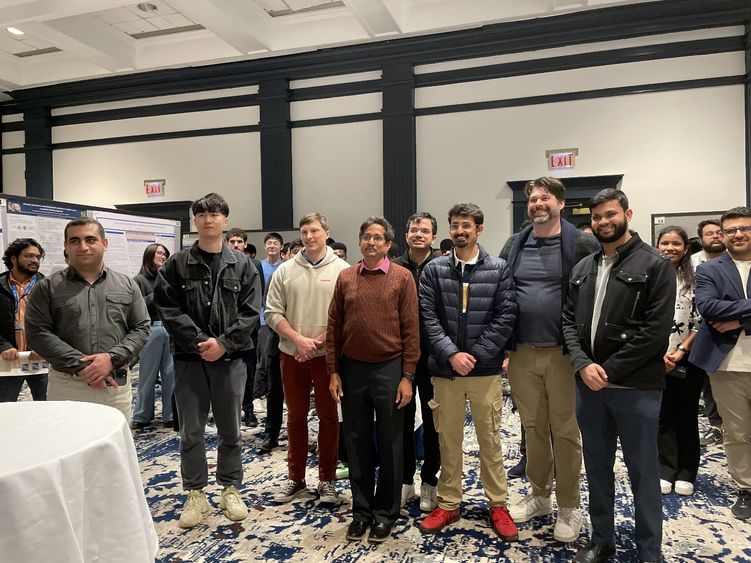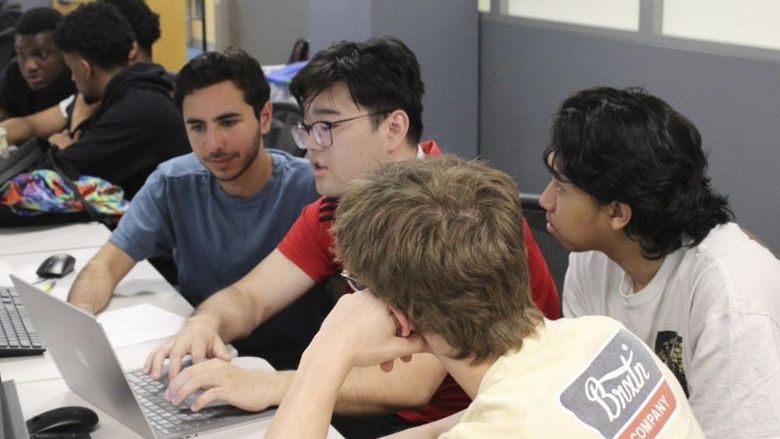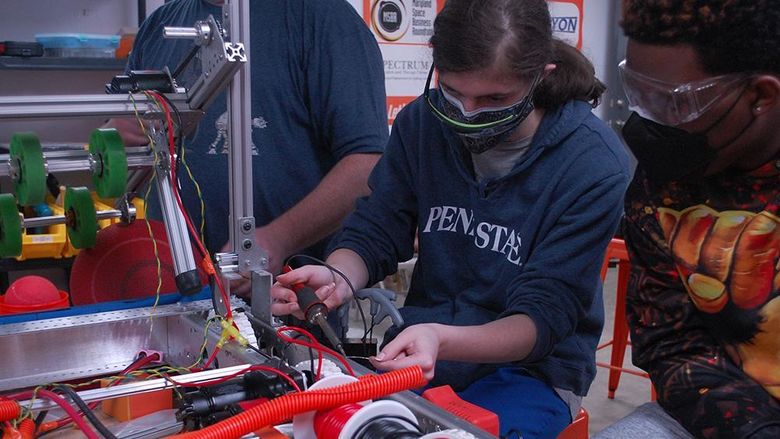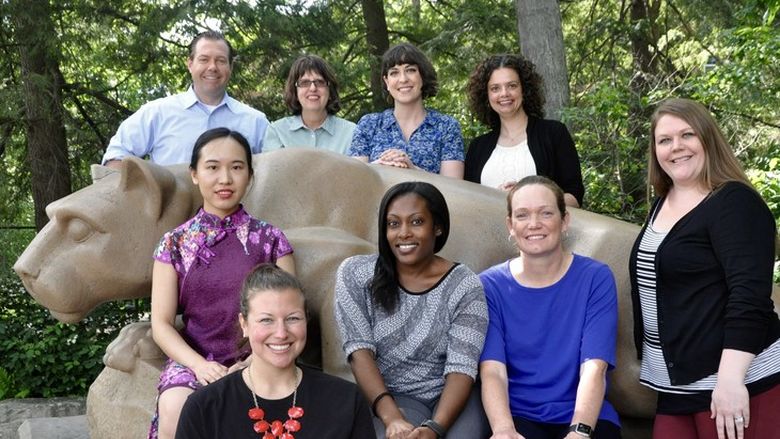
Penn State's AI Week, coordinated by the Penn State AI Hub, brings University faculty, students and staff together to showcase ongoing artificial intelligence research, activities, education and outreach across campuses. Above, AI Week poster session and AI Awards winners stand with Vijaykrishnan Narayanan, associate dean for innovation in the College of Engineering, and Patrick Dudas, associate director of the Penn State Center for Immersive Experiences, who coordinated AI Week events.
UNIVERSITY PARK, Pa. — Penn State’s AI Week showcased the latest research on artificial intelligence (AI) systems and tools, with a specific focus on their applications across K-12 and higher education.
The annual event, most recently held April 14 through April 17, highlighted Penn State faculty and student research and excellence through panels, research showcases, immersive workshops and a poster session.
“AI Week brought faculty, staff and students together to further build on and enhance the AI community at Penn State,” said Mehrdad Mahdavi, Penn State AI Hub director and associate professor. “AI Week spotlighted ways in which AI tools and systems can be used for research, for career readiness, for accelerating science, for creative assistants, and how it can be used in the classroom. We hope the events fostered conversations and new collaborations amongst researchers across Penn State.”
The student poster session featured over 60 research projects focused on AI and machine learning across diverse disciplines. The projects ranged from using AI to predict and prevent all-terrain vehicle rollovers and deaths to mushroom picking strategy algorithms to empathetic conversation models in mental health to how students feel about responsible versus irresponsible AI use.
Undergraduates, graduate students and Penn State faculty submitted their research to a judging panel, which awarded prizes to six poster presenters:
-
First place of $300 was awarded to Samarth Khanna, second-year doctoral student in the College of Information Sciences and Technology, “Distributive Fairness in Large Language Models: Evaluating Alignment with Human Values”
-
Second place of $250 was awarded to Kanguri Han, second-year doctoral student in the Department of Agricultural and Biological Engineering in the Penn State College of Agricultural Sciences, “Vision Apple Quality Assessment System for Selective Robotic Harvesting in Complex Orchard Environment”
-
Third place of $150 was awarded to Suhas Bettapalli Nagaraj, fourth-year doctoral student in the College of Information Sciences and Technology, “Generative AI for Efficient and Empathetic Conversational Models in Mental Health”
Three honorable mentions of $100 each were awarded to Matthew Poska, informatics doctoral student in the College of Information Sciences and Technology; Sohrab Sheikh Sofla, electrical engineering doctoral student; and Waquar Kaleem, industrial and manufacturing engineering doctoral student.
“Presenting my work, which focused on fair decision-making in economic contexts, at the poster session brought me to meet others working on different aspects of fairness in AI and opened up my possibilities for potential collaborations,” Khanna said.
Bettapalli Nagaraj, a fourth-year doctoral student, collaborates with clinicians at Emory University and Georgia Institute of Technology to develop empathetic AI tools for mental health. His research created realistic, trauma-specific therapy simulations and trained small, efficient AI models to support therapist training and patient care. He also developed an audio-based system that can evaluate therapy sessions without needing transcripts.
“It’s important that we make people more aware of AI’s capabilities and that it can be used for social good,” he said.
AI Week panels spotlighted various Penn State research faculty from the Center for Artificial Foundations and Scientific Applications (CENSAI) and the Center for Artificial Intelligence Foundations and Engineered Systems (CAFE), who discussed current uses for AI research in weather prediction, biology, transportation and building infrastructure.
"AI at Penn State is vibrant and growing — the depth and breadth of AI research and the vibrancy at the events during AI Week was ample proof. It was a melting pot of ideas from theoretical advances to technology transition,” said Vijay Narayanan, associate dean for innovation and CAFE director. “I am grateful to be part of this AI community at Penn State.”
The last day of AI Week focused on AI in K-12 education hosted by the Penn State Center for Science and the Schools (CSATS), with workshops on AI policy and guidelines for education; leveraging tools to explore pathways to rewarding careers; building AI use in classrooms; prompt engineering; using AI to support conservation; and avoiding pitfalls of AI use.
"K-12 day during AI Week successfully demonstrated the powerful research translation work and broader impacts of AI through the Penn State CSATS and our amazing researchers, significantly elevating their impact,” said Jeff Remington, CSATS outreach liaison.
Betsy Campbell, an associate teaching professor in the College of Information Sciences and Technology and Fulbright Specialist in AI and Society issues, highlighted how AI is also relevant in the arts by coordinating multiple activities, including a human-robot dance performance and the curation of a visual art gallery about the impact of AI on society.
“This particular way of using AI to explore the frontiers of human robot interaction is unique to Penn State,” Campbell said as she welcomed the audience at the “Post-human Performance: An AI-enabled Dance Recital,” which was held on April 17.
Student participants used AI to choreograph a three-minute dance that they then had to program a robot to perform. The robot had to act as a partner on the dance team rather than as a prop for human dancers.
“AI is often portrayed negatively,” said Gabe Selan, senior industrial engineering major, who participated in the activity. “Not many people understand it. We were able to showcase what AI can do in a creative way in a way to lessen the stigma.”
Kait Martin, a third-year enterprise technology integration major who also participated in the performance, agreed.
“Embracing AI in this way allowed us to see a human element in the technology,” Martin said. “It’s limitless. This technology could be deployed in other domains and make an impact.”
Other AI Week events included the Nittany AI Alliance’s Nittany AI Challenge awards which selected five student teams to share prize money when developing projects that use AI tools for social good
For links to recorded virtual sessions and more information about AI Week, visit the AI Hub website.






